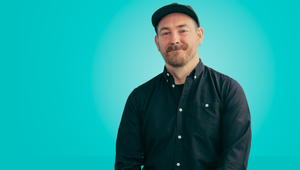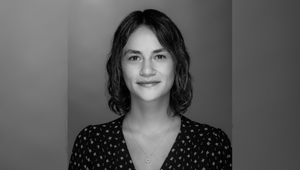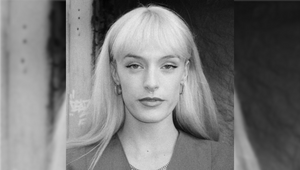
The Directors: Jonas Odell

Jonas Odell specialises in making films mixing live action and various mixed media animation techniques. In some of his more recent short films he has explored a mix of documentary, staged and animated elements. Jonas was one of the founders of the Stockholm based animation studio 'FilmTecknarna' and has made short films as well as commissioned work and commercials through the studio. His short film 'Lies' was awarded as Best international short at the Sundance film festival. Three of his short films have also been awarded the 'Guldbagge', the Swedish movie award. Jonas Odell has also directed music videos for artists such as The Rolling Stones, Goldfrapp, U2 and Franz Ferdinand as well as directed commercials for a number of big brand clients including BMW, Volvo, McDonalds, IKEA and Google.
Name: Jonas Odell
Location: Stockholm, Sweden
Repped by/in: Dress Code in US/Canada
Awards: Golden Bear - Berlin Film festival, Best short Film - Sundance, Best breakthrough video MTV Awards, Golden gate Award X 4 – San Francisco Film festival, plus a bunch of other festival awards. (…and a Grammy nomination…)
LBB> What elements of a script sets one apart from the other and what sort of scripts get you excited to shoot them?
Jonas> One thing that definitely sets some scripts apart is if there is a creative/visual solution organically presenting itself when you read the script. That solution could be present in the agency brief, or if there is a more open brief it would come to you at the first read through. The important thing is that you’re not forcing a random cool visual concept onto the content, but that it grows out of the campaign objectives and the basis of the script.
Directing spots that usually rely on some kind of 'visual magic', getting scripts that combine that magic with a more human touch, storytelling, and emotional content definitely excites me. 'Just' creating a visual fireworks display is fun, but being able to combine that with emotional content of course tops that.
LBB> How do you approach creating a treatment for a spot?
Jonas> I think the most important thing up front is to analyse the script and whatever reference material comes with the brief and from there, try to look beyond them and identify where those ideas are coming from. This is done both through discussions with the agency and analysis of the material. I think it is massively important to understand where the creative starting point for the agency was in order to be able to add something to the project.
Creating the actual treatment, I find that writing and visual development goes hand in hand. Rather than starting with one or the other I think they feed off each other all the way through the process.
LBB> If the script is for a brand that you're not familiar with/ don’t have a big affinity with or a market you're new to, how important is it for you to do research and understand that strategic and contextual side of the ad? If it’s important to you, how do you do it?
Jonas> In general, I find that agencies nowadays are very good at outlining the brand’s position and tradition, but yes, it is important to do research into both the brand and the market. Looking at previous ads as well as competition are obvious ways of learning more, but also just plain web search to find mentions of a brand to try to pinpoint where the brand is in the public eye is useful. Speaking to someone who knows the specific market/product is also helpful. Maybe most important is trying to understand what the campaign is hoping to do in terms of changing the perception of the brand.
LBB> For you, what is the most important working relationship for a director to have with another person in making an ad? And why?
Jonas> Being able to work closely with agency creatives is the most important thing I’d say. Also, that intersection of director, client, agency is incredibly important to nurture and it is equally important to make the best use possible of those rare moments when all are gathered to make sure everyone is on the same page and trust each other to all be working for the common good of the production.
LBB> What type of work are you most passionate about - is there a particular genre or subject matter or style you are most drawn to?
Jonas> I realise this is not an easy sell, but when it comes to commercials, the kind of work that I haven’t done before, the work that offers a new direction. Projects come along occasionally that naturally lend themselves to going down new routes, adding new styles, techniques, or creative concepts to the toolbox. This never happens by gratuitously sneaking in 'cool stuff' into the concept, but always comes out of analysing scripts and briefs and coming up with solutions that in retrospect turn out to have been pivotal in what I do creatively as well as having added something unique to the brand advertised.
Then of course, outside of the world of commercials I’ve been fortunate to be able to choose and tell stories that interest me, collecting 'true stories' based on my curiosity about people, events and social phenomena. For a curious person that is a life of luxury.
LBB> What misconception about you or your work do you most often encounter and why is it wrong?
Jonas> As someone who works in different fields, different styles, and different techniques, I’d say that most misconceptions stem from having only seen parts of the work. I’d might be seen as the collage guy, the kaleidoscope guy, the animated-true-stories guy, or the music promo guy, but these are all just parts of the picture. I’d like to think that it is always about the approach to the project rather than specific styles, techniques or genres.
LBB> Have you ever worked with a cost consultant and if so how have your experiences been?
Jonas> In those instances where a cost consultant has been involved I think in most of the cases it has been for the good of the production, allowing everyone to have realistic expectations.
LBB> What’s the craziest problem you’ve come across in the course of a production – and how did you solve it?
Jonas> In terms of crazy, I guess the production runner getting arrested for kidnapping during the first shoot I did in London would qualify. (He was innocent by the way…) But I can’t really say I solved that one, unless temporarily ignoring it counts as solving…
One problem that probably isn’t 'crazy' when you think about it, but that surprised me at first, was finding that talent (especially on music videos) that supposedly are comfortable with performing in front of thousands of people suddenly become very self-conscious on a film set. The solution is both to try to create a relaxed atmosphere around the talent, but also to come prepared with multiple, very detailed actions for everyone visible in camera, down to every single extra. In the best of worlds, it develops organically as a collaboration on set, but should that fail, keeping everyone busy and in the moment keeps the spectre of self-consciousness at bay.
LBB> How do you strike the balance between being open/collaborative with the agency and brand client while also protecting the idea?
Jonas> I think it is very important to use those precious moments where client, agency and director are gathered to make sure everyone is completely in synch with the idea and how it relates to brand strategy. This is mainly the agency’s responsibility, but whatever I can do to also explain that whatever I add to the idea is based on the same perception of the brand is equally important. And of course, the most successful ideas that also have the best chance of surviving uncompromised through the whole production are the ones that spring organically out of a brand strategy.
As a director you are also the representative of the audience, and need to help everyone at times take a step back and try to see how an audience will view and interpret the ad.
LBB> What are your thoughts on opening up the production world to a more diverse pool of talent? Are you open to mentoring and apprenticeships on set?
Jonas> We tend to think about these things in terms of equality and fairness, which is important, but you can also simply think about it in terms of quality. If we only bring in people with a specific background, we will also have missed many individuals with a potential to create great work. So, yes, I think it is important for several reasons. Also, I think the industry has benefited greatly not only by including people with diverse personal backgrounds, but also from diverse professional backgrounds. The technological threshold is lower than ever, and people can prove their creative potential producing work on consumer technology even if their background isn’t in filmmaking, and that has had immense creative impact on the art of moving images in general.
LBB> How do you feel the pandemic is going to influence the way you work into the longer term? Have you picked up new habits that you feel will stick around for a long time?
Jonas> For one thing it finally killed off the old “conference call” with the most important people in the meeting seated furthest away from a dodgy speakerphone in the middle of an echo chamber. I think the pandemic and an awareness of climate footprints between them have helped creating a healthier, more efficient way of collaborating at a distance, ensuring good communication.
I’ve also found that we work with creative talent based in different parts of the world even more than we used to, now that people get more used to not being in the same room as their co-workers. On a recent project, we had people in Sweden, the Netherlands and Brazil all collaborating on the same animation shots.
LBB> Your work is now presented in so many different formats - to what extent do you keep each in mind while you're working (and, equally, to what degree is it possible to do so)?
Jonas> When work first started appearing on multiple platforms, there was a hope that a campaign could consist of many parts each tailored for a specific platform, and all complementing each other. The reality has turned out to be that the expectation is to make the same material work in a multitude of different formats. This is not ideal in that it inevitably means some formats will work less well than others, but it is the reality we need to deal with. When working with animation- or post-heavy projects this is easier to navigate as you can move things around both in time and in placement, so there we are more flexible in planning a project with all formats in mind. Either way it is essential to keep all formats in mind when planning the production, and to discuss up front what the solutions are and what might need to be prioritised.
LBB> What’s your relationship with new technology and, if at all, how do you incorporate future-facing tech into your work (e.g., virtual production, interactive storytelling, AI/data-driven visuals etc)?
Jonas> One important early influence on my thinking was a book by graphic designer Terry Jones, art director for British Vogue and co-founder of i-D magazine. I was hugely inspired by his use of every available technology, whether hi-tech or lo-fi. He was among the first to use computers for typography at a time when they were decidedly lo-fi with pixels the size of basketballs. I have always tried to make use of all the technology available to me, whether future-facing or analogue, and to try to figure out new ways to use and mix that technology.
LBB> Which pieces of work do you feel really show off what you do best – and why?
Jonas> I’d pick projects from different fields because the challenges are slightly different.
From the world of broadcast design, I’d pick the title sequence for the Viaplay/MGM horror/cop series 'The Box'. In a stylised way the titles manage to convey the mental state of the show’s main protagonist played by Anna Friel.
The first seasons of ads for the beauty retailer 'KICKS' is another interesting project. The ads went down very well with both client and audience. They are on one hand very directly based on campaign objectives and product strategies, but on the other hand giving rise to questions like “what were you on when you came up with this?”.
As for music videos I’d pick an old favourite, 'Take me out' by Franz Ferdinand. I think this as an interesting example of a video that tells a story, although it is not apparent at first glance. The band wanted something in the style of Dadaist photo-collage. Trying to figure out the background of the very specific request, the first (and very unfair) interpretation might be that they are a bunch of art school students engaging in name dropping, but I realised that it went deeper than that. Their music was part of the post-punk revival at the time and thinking about how the bands that inspired them used Dadaist and other related art styles for their graphics and album covers, and how punk itself was music as anti-music in the same way that Dada was art as anti-art, I realised that this was a way of actually telling the story of the band’s music through visual references.
As far as narrative short films go, I’d pick the short 'Never like the first time!' as an example of the approach to allowing the story itself decide the tone and style of the storytelling. When working with real people’s personal 'true stories', the challenge is to package these stories to make sure they reach an audience, while at the same time making sure you respect the stories and convey what the interviewee themselves seem to want to convey. In this and other short films I’ve made with several stories on the same subject, you’ll find that the style of editing, staging, animation and even music/sound design differs for each segment based on the tone and content of that specific story.















